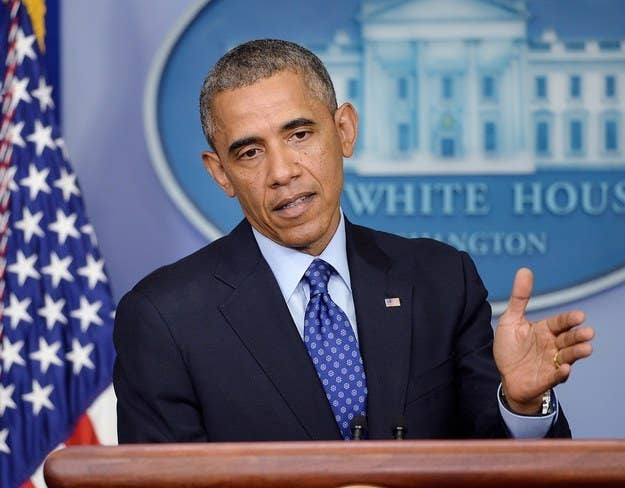
WASHINGTON — When the Center for American Progress embraced the idea of an American military response to the chaos in Iraq last week, it split from many liberal groups formally opposing any new U.S. military intervention, no matter how limited.
Former employees at the liberal think thank — closely aligned with the Obama administration — were dismayed.
"One of the things that CAP can be proud of is its opposition to the Iraq War and authoring one of the first reports advocating for disengagement from the conflict," said Zaid Jilani, a former writer at CAP's news site, ThinkProgress. "Unfortunately, the think tank's newest report seems to be advocating for militarily taking sides in a civil war between one side that is dropping barrel bombs on civilians, torturing prisoners, and alienating Sunnis, and another side that is conducting mass executions of Shias."
"The U.S. has played this game of picking sides in the Middle East for long enough," Jiliani, who left ThinkProgress amid a debate about the progressive movement's relation to Israel and after he accused some American advocates for Israel of being "Israel firsters" on Twitter.
The think tank's report specifically keeping airstrikes on the table in Iraq raised eyebrows when it emerged days before President Obama announced his plan for strictly limited military assistance to the Iraqi regime, including the potential for targeted airstrikes.
Former CAP officials, some of whom declined to be named or quoted, grumbled that the think tank report sounded a lot like Obama's eventual course of action in Iraq and complained that the organization was getting too close to the White House on foreign policy matters, even if they didn't completely disagree with the findings of the CAP report.
Most did completely disagree with the findings of the CAP report, however.
"It's quite a contrast to see the organization that pushed for the withdrawal of U.S. troops in 2005 now suggesting that airstrikes and 'limited counterterrorism' operations might be necessary," said a former CAP staffer who worked in the foreign policy arena. "It's hard to see this as anything other than Washington's leading Democratic Party-aligned think tank advocating for a re-engagement (as limited as it may be) of U.S. military assets in Iraq."
A spokesperson for the think tank did not respond to a request for comment.
But a top foreign policy expert at CAP said there has been a lot of controversy surrounding the think tank's Iraq report, though he dismissed the critics as uninformed.
"You're not the first one who's called me on this," Lawrence Korb, a former deputy secretary of defense for Ronald Reagan who's been a longtime senior fellow at CAP, said in an interview Friday.
Korb wasn't an author of CAP's Iraq report, but he said he supports its findings and says it is not a pro-war document.
"What they said is, [military strikes are] an option that you might consider with a lot of caveats," he said. "That's being read as 'let's bomb them now.'"
"That's not really what we said!" Korb said in a fairly animated interview that indicated the attacks on the CAP study were causing some frustration. Critics "didn't read the report, they just heard the headline," he said.
"Am I surprised at the way things get picked up? No," he said. "I'm an academic and so I know what it's like when someone writes a long book and people just read the cover."
The CAP report lists five recommendations for how the U.S. should proceed in Iraq. They include making U.S. aid to the embattled Iraqi regime conditional on significant reform efforts; including Iran in a "full-court press" effort to alienate the terrorist group ISIS; bolstering regional allies; and "[preparing] for limited counterterrorism operations against ISIS, including possible air strikes."
ISIS, the report states, "poses an immediate threat to Iraq and a possible terrorist threat to the United States and its allies." The authors call on the Obama administration to prepare for "limited use" of airstrikes and the positioning of associated military assets, including advisers on the ground in Iraq. That's close to Obama's actual course of action in Iraq, which included positioning an aircraft carrier in the region, dispatching hundreds of military advisers, and promising that military strikes were a possibility even as he explicitly ruled out ground combat operations.
Progressive critics of CAP, Korb said, are making unfair claims about CAP's closeness to Obama's team. He insisted that if someone else was in the White House, CAP would be calling for the same course of action.
"These are people who know a heck of a lot about the Middle East," he said. Korb added that he wasn't backing the report because he's associated with CAP, but because it reflects his own views on the conflict. "We don't have groupthink over there or anything," he said.
Korb said removing the option of airstrikes is foolish, considering the swiftly shifting situation in Iraq.
"It's not saying 'let's have airstrikes,' it's saying that's something you can't take off the table right away," he said. "There's a big difference there."
